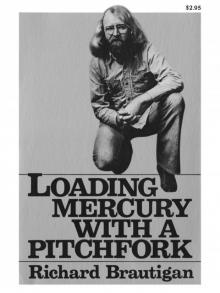Read Loading Mercury With a Pitchfork Storyline:
Anonymous. "Brautigan, Richard." Kirkus Reviews 15 March 1976: 355.Brautigan-the-poet is at it again (The Pill versus The Springhill Mine Disaster, Rommel Drives On Deep into Egypt), and this fey little volume, with its modest startles, immortalized yawns, and affected yet likable artlessness, should reopen the languid debate over whether what he's writing is American haiku or surrealist Rod McKuen. Let's say a little of both. Brautigan has by now so thoroughly exercised what he calls the "invisible muscle" of daydream that he can conjure up his trademark lines ("a penny smooth as a star") and similes ("great huge snowflakes like millions/ of transparent washing machines") with a felicity bordering the facile. His inspiration is exceedingly short-winded, and the great majority of these poems are little more than five or six lines, sometimes less; many consist of one wee brainstorm image around which a minimum of grammatical trimming droops like whilted parsley. It's enough to aggravate any "serious" poet who struggles much harder for a far meagerer living; but for the reader Brautigan has his slight charm, his evocation of bemused mood, which occasionally shafts deeper. These poemlets range from simple, near-banal statement of familiar emotions ("For fear you will be alone/ you do so many things/ that aren't you at all") to a little gallery of disappointed and hopeful people; to the hot, empty landscapes and "gasoline ghosts" of highway America; to the all-embracing solipsism of small sensual contentments ("A beautiful girl is watching/ the bacon"); to such darker, more original dream-visions as "Toward the pleasures of reconstituted crow/ I collect darkness within myself like the shadow/ of a blind lighthouse."—. "Brautigan, Richard." The Booklist 15 May 1976: 1329.Typical Brautigan whimsy, whether insightful or seemingly meaningless, in short poems with appeal mainly for the writer's following.—. "Brautigan, Richard." Choice September 1976: 815.Not everyone likes or even manages to respect the poetry of Richard Brautigan; and even its fans must feel the urge to withdraw their acclaim from at least certain of his pieces, if only in self-defense. For Brautigan's work is nothing if not charming, and to admit to being in charm's thrall is hardly in keeping with the temper of the times. Brautigan does not care, even if one reader's excluded poems are precisely the favorites of another, for ease of operation is his keynote and his method too. "Finding is losing something else./ I think about, perhaps even mourn,/ what I lost to find this," he writes—a typical poem in its entirety. If that is a poem, what about "Impasse": "I talked a good hello/but she talked an even/ better good-bye"? Found on facing pages, these two pieces exemplify the arguable strengths and weaknesses of Brautigan's output: the tendency to flatten into prose so familiar one cannot stifle his "So what?", and the ripple in the affections achieved by just the same means. The best of his works are coy little presences that won't go away, cute poem-pooches, while the worst are harmless neighbors of the first. But Brautigan is all that survives of the generation of young writers to come along in the California of the 1960s, and his readership is large enough to make ordering his titles an automatic gesture by most librarians—especially, of course, those at universities.Bokinsky, Caroline J. "Richard Brautigan." Dictionary of Literary Biography. Vol. 5: American Poets Since World War II. Ed. Donald J. Greiner. Detroit: Gale Research Company, 1980. 96-99.Brautigan's terse messages and witty similes are overshadowed by a blacker humor and a darker, more pensive mood. The poems are more personal; the reader even glimpses the poet in the process of writing. . . . A poet who once saw life in pleasant, whimsical analogies is now filled with foreboding and pessimism. His sensations are no longer so acute. . . . He concludes the volume with an existential pose [convincing himself that his actions have some value].Daum, Timothy. "Brautigan, Richard." Library Journal 101(15) 1 September 1976: 1780.Brautigan's poetic style, previously centered around eclectic insights into how everyday events are transformed into art, is here reduced to quick simulacra of bitter thoughts and cynical visions—his verse abounds with misplaced love, lonely nights, and jealous stabs at previous lovers. Commonplace images are mutated into uneasy jokes: "They said that/ my telephone/ would be fixed/ by 6./ They guaranteed/ it." Even the lighter poems, such as "Information" or "We meet, We try. Nothing happens, but." are deeply trained by Brautigan's ego, and a very few express and evoke the silent delight that has marked his recent novels. Desperation is a constant theme, as in "War Horse": "He has been made invisible/ by his own wounds./ I know how he feels." Where is the real Richard Brautigan: in his novels or his poems? Either way, his readers will ask for these poems, and few poetry colletions can afford to be without this work.Pages of Loading Mercury With a Pitchfork :
